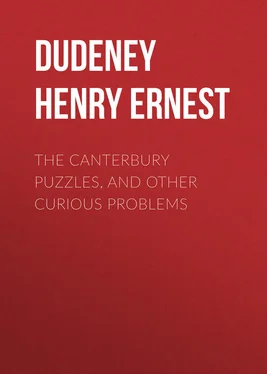Henry Dudeney - The Canterbury Puzzles, and Other Curious Problems
Здесь есть возможность читать онлайн «Henry Dudeney - The Canterbury Puzzles, and Other Curious Problems» — ознакомительный отрывок электронной книги совершенно бесплатно, а после прочтения отрывка купить полную версию. В некоторых случаях можно слушать аудио, скачать через торрент в формате fb2 и присутствует краткое содержание. Жанр: foreign_prose, foreign_antique, на английском языке. Описание произведения, (предисловие) а так же отзывы посетителей доступны на портале библиотеки ЛибКат.
- Название:The Canterbury Puzzles, and Other Curious Problems
- Автор:
- Жанр:
- Год:неизвестен
- ISBN:нет данных
- Рейтинг книги:4 / 5. Голосов: 1
-
Избранное:Добавить в избранное
- Отзывы:
-
Ваша оценка:
- 80
- 1
- 2
- 3
- 4
- 5
The Canterbury Puzzles, and Other Curious Problems: краткое содержание, описание и аннотация
Предлагаем к чтению аннотацию, описание, краткое содержание или предисловие (зависит от того, что написал сам автор книги «The Canterbury Puzzles, and Other Curious Problems»). Если вы не нашли необходимую информацию о книге — напишите в комментариях, мы постараемся отыскать её.
The Canterbury Puzzles, and Other Curious Problems — читать онлайн ознакомительный отрывок
Ниже представлен текст книги, разбитый по страницам. Система сохранения места последней прочитанной страницы, позволяет с удобством читать онлайн бесплатно книгу «The Canterbury Puzzles, and Other Curious Problems», без необходимости каждый раз заново искать на чём Вы остановились. Поставьте закладку, и сможете в любой момент перейти на страницу, на которой закончили чтение.
Интервал:
Закладка:
There is an interesting passage in praise of puzzles in the quaint letters of Fitzosborne. Here is an extract: "The ingenious study of making and solving puzzles is a science undoubtedly of most necessary acquirement, and deserves to make a part in the meditation of both sexes. It is an art, indeed, that I would recommend to the encouragement of both the Universities, as it affords the easiest and shortest method of conveying some of the most useful principles of logic. It was the maxim of a very wise prince that 'he who knows not how to dissemble knows not how to reign'; and I desire you to receive it as mine, that 'he who knows not how to riddle knows not how to live.'"
How are good puzzles invented? I am not referring to acrostics, anagrams, charades, and that sort of thing, but to puzzles that contain an original idea. Well, you cannot invent a good puzzle to order, any more than you can invent anything else in that manner. Notions for puzzles come at strange times and in strange ways. They are suggested by something we see or hear, and are led up to by other puzzles that come under our notice. It is useless to say, "I will sit down and invent an original puzzle," because there is no way of creating an idea; you can only make use of it when it comes. You may think this is wrong, because an expert in these things will make scores of puzzles while another person, equally clever, cannot invent one "to save his life," as we say. The explanation is very simple. The expert knows an idea when he sees one, and is able by long experience to judge of its value. Fertility, like facility, comes by practice.
Sometimes a new and most interesting idea is suggested by the blunder of somebody over another puzzle. A boy was given a puzzle to solve by a friend, but he misunderstood what he had to do, and set about attempting what most likely everybody would have told him was impossible. But he was a boy with a will, and he stuck at it for six months, off and on, until he actually succeeded. When his friend saw the solution, he said, "This is not the puzzle I intended—you misunderstood me—but you have found out something much greater!" And the puzzle which that boy accidentally discovered is now in all the old puzzle books.
Puzzles can be made out of almost anything, in the hands of the ingenious person with an idea. Coins, matches, cards, counters, bits of wire or string, all come in useful. An immense number of puzzles have been made out of the letters of the alphabet, and from those nine little digits and cipher, 1, 2, 3, 4, 5, 6, 7, 8, 9, and 0.
It should always be remembered that a very simple person may propound a problem that can only be solved by clever heads—if at all. A child asked, "Can God do everything?" On receiving an affirmative reply, she at once said: "Then can He make a stone so heavy that He can't lift it?" Many wide-awake grown-up people do not at once see a satisfactory answer. Yet the difficulty lies merely in the absurd, though cunning, form of the question, which really amounts to asking, "Can the Almighty destroy His own omnipotence?" It is somewhat similar to the other question, "What would happen if an irresistible moving body came in contact with an immovable body?" Here we have simply a contradiction in terms, for if there existed such a thing as an immovable body, there could not at the same time exist a moving body that nothing could resist.
Professor Tyndall used to invite children to ask him puzzling questions, and some of them were very hard nuts to crack. One child asked him why that part of a towel that was dipped in water was of a darker colour than the dry part. How many readers could give the correct reply? Many people are satisfied with the most ridiculous answers to puzzling questions. If you ask, "Why can we see through glass?" nine people out of ten will reply, "Because it is transparent;" which is, of course, simply another way of saying, "Because we can see through it."
Puzzles have such an infinite variety that it is sometimes very difficult to divide them into distinct classes. They often so merge in character that the best we can do is to sort them into a few broad types. Let us take three or four examples in illustration of what I mean.
First there is the ancient Riddle, that draws upon the imagination and play of fancy. Readers will remember the riddle of the Sphinx, the monster of Bœotia who propounded enigmas to the inhabitants and devoured them if they failed to solve them. It was said that the Sphinx would destroy herself if one of her riddles was ever correctly answered. It was this: "What animal walks on four legs in the morning, two at noon, and three in the evening?" It was explained by Œdipus, who pointed out that man walked on his hands and feet in the morning of life, at the noon of life he walked erect, and in the evening of his days he supported his infirmities with a stick. When the Sphinx heard this explanation, she dashed her head against a rock and immediately expired. This shows that puzzle solvers may be really useful on occasion.
Then there is the riddle propounded by Samson. It is perhaps the first prize competition in this line on record, the prize being thirty sheets and thirty changes of garments for a correct solution. The riddle was this: "Out of the eater came forth meat, and out of the strong came forth sweetness." The answer was, "A honey-comb in the body of a dead lion." To-day this sort of riddle survives in such a form as, "Why does a chicken cross the road?" to which most people give the answer, "To get to the other side;" though the correct reply is, "To worry the chauffeur." It has degenerated into the conundrum, which is usually based on a mere pun. For example, we have been asked from our infancy, "When is a door not a door?" and here again the answer usually furnished ("When it is a-jar") is not the correct one. It should be, "When it is a negress (an egress)."
There is the large class of Letter Puzzles, which are based on the little peculiarities of the language in which they are written—such as anagrams, acrostics, word-squares, and charades. In this class we also find palindromes, or words and sentences that read backwards and forwards alike. These must be very ancient indeed, if it be true that Adam introduced himself to Eve (in the English language, be it noted) with the palindromic words, "Madam, I'm Adam," to which his consort replied with the modest palindrome "Eve."
Then we have Arithmetical Puzzles, an immense class, full of diversity. These range from the puzzle that the algebraist finds to be nothing but a "simple equation," quite easy of direct solution, up to the profoundest problems in the elegant domain of the theory of numbers.
Next we have the Geometrical Puzzle, a favourite and very ancient branch of which is the puzzle in dissection, requiring some plane figure to be cut into a certain number of pieces that will fit together and form another figure. Most of the wire puzzles sold in the streets and toy-shops are concerned with the geometry of position.
But these classes do not nearly embrace all kinds of puzzles even when we allow for those that belong at once to several of the classes. There are many ingenious mechanical puzzles that you cannot classify, as they stand quite alone: there are puzzles in logic, in chess, in draughts, in cards, and in dominoes, while every conjuring trick is nothing but a puzzle, the solution to which the performer tries to keep to himself.
There are puzzles that look easy and are easy, puzzles that look easy and are difficult, puzzles that look difficult and are difficult, and puzzles that look difficult and are easy, and in each class we may of course have degrees of easiness and difficulty. But it does not follow that a puzzle that has conditions that are easily understood by the merest child is in itself easy. Such a puzzle might, however, look simple to the uninformed, and only prove to be a very hard nut to him after he had actually tackled it.
Читать дальшеИнтервал:
Закладка:
Похожие книги на «The Canterbury Puzzles, and Other Curious Problems»
Представляем Вашему вниманию похожие книги на «The Canterbury Puzzles, and Other Curious Problems» списком для выбора. Мы отобрали схожую по названию и смыслу литературу в надежде предоставить читателям больше вариантов отыскать новые, интересные, ещё непрочитанные произведения.
Обсуждение, отзывы о книге «The Canterbury Puzzles, and Other Curious Problems» и просто собственные мнения читателей. Оставьте ваши комментарии, напишите, что Вы думаете о произведении, его смысле или главных героях. Укажите что конкретно понравилось, а что нет, и почему Вы так считаете.












